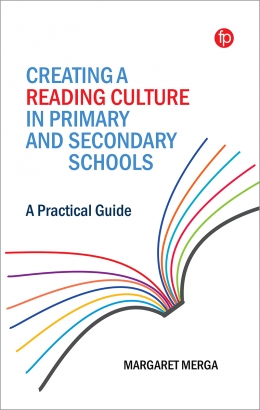
Primary tabs
You don't need to be an ALA Member to purchase from the ALA Store, but you'll be asked to create an online account/profile during the checkout to proceed. This Web Account is for both Members and non-Members.
If you are Tax-Exempt, please verify that your account is currently set up as exempt before placing your order, as our new fulfillment center will need current documentation. Learn how to verify here.
- Description
- Table of Contents
- About the author
Listen to a podcast with the author now!
Drawing on the author's internationally-recognised experience in this field, this book will be essential reading for anyone looking to develop reading in schools.
Did your school encourage a life-long love of reading? Children who identify as readers are three times more likely to have good mental wellbeing. A reading culture that permeates a school can transform it into a space where reading is supported, encouraged, normalized, and valued. Creating a Reading Culture in Primary and Secondary Schools will help teachers and librarians to
- advocate for the importance of a whole-school reading culture with recent research in this field;
- select from a number of research-supported strategies underpinning a whole-school reading culture to tailor your school's approach according to resourcing and priorities;
- develop a clear trajectory for building and sustaining stakeholder engagement and resourcing, including securing external funding for related initiatives; and
- plan and manage a multi-faceted approach to enable real change within your school.
Read a sample of this book now!
Introduction
1. Why a whole school reading culture?
- Reading and social and environmental supports
- Expired expectations and orphaned responsibility
- Reading beyond testing
- Benefits of reading engagement for literacy
- Literacy and cross-curricular learning
- Real world advantages
- The question of gender
- Sliding literacy, reading interest and reading frequency
- Read anything for literacy?
- The ongoing importance of paper books
- The importance of the school library
- Recovering from COVID-19 related literacy learning loss
2. Research-supported practices to choose from
- Opportunities for regular silent reading for pleasure
- Supporting choice
- Accessible and visible books
- Investment in school libraries and collection building
- Investment in qualified school library professionals
- Teacher modelling
- Engaging parental support Talking about books
- Creating and sustaining reading spaces
- Reading aloud
- Professional development and laying the foundation
- Promising emerging possibilities
- Activities to be subject to measures of effectiveness
3. Stakeholder engagement and resourcing
- Planning for initial and sustained educator and leader engagement
- Parents and guardians
- Grants for school based research initiatives
4. Implementation planning and change management
- Leading change in schools
- Assess the opportunity for change and empower others to commit
- Create and support a reading culture team
- Formulate and communicate a powerful vision of the change
- Plan for implementation
- Writing implementation plans
5. Monitor and strengthen the change process over time
- Evaluation
- More about goals
- Introduction to basic quantitative, qualitative and mixed methods analysis and data
- Getting quality evaluation data from children
- Quantitative analysis and data for schools
- Qualitative analysis and data for schools
- Mixed methods analysis and data for schools
- Determining baseline data needs and evaluation planning
- Boosting quality with academic partnership
6. Reporting
- Ethical reporting
- Professional outputs
- Media outputs
- Academic outputs
- Final points
Conclusions
- We need more research
Margaret K. Merga
Dr. Margaret K. Merga is an honorary adjunct at the University of Newcastle, Australia and a senior researcher in literacy, library and research communication. She also works as an author and consultant at Merga Consulting, supporting schools and professional associations seeking to build school reading cultures and enhance school library advocacy.
Dr. Merga has previously consulted with schools, professional associations, research entities and government departments on a range of literacy and library initiatives, such as the Department of Education Western Australia's Never Stop Reading initiative. Since 2012, she has led or been involved in 18 research projects on libraries, literacy, higher education communication and/or workforce issues. She has shared findings from her research in invited keynotes and conference papers at virtual conferences all over the world, and has published more than 85 peer-reviewed journal articles and three research-informed books.


